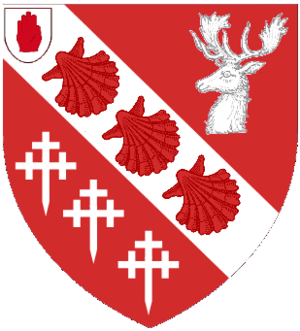Sir Charles Petrie, 3rd Baronet facts for kids
Quick facts for kids
Sir Charles Alexander Petrie
|
|
|---|---|
| Born | 28 September 1895 Liverpool, England, United Kingdom of Great Britain and Ireland |
| Died | 13 December 1977 |
| Occupation | Historian |
| Nationality | British |
| Education | Oxford degree |
Sir Charles Alexander Petrie, 3rd Baronet CBE (born September 28, 1895 – died December 13, 1977) was a famous British historian. He was known for writing many books about history, especially about royal families and important political events. He also worked as a journalist and edited several magazines.
Contents
Growing Up and Education
Charles Petrie was born in Liverpool, England. He was the younger son of Sir Charles Petrie, 1st Baronet, and his wife, Hannah. He studied at the University of Oxford. In 1927, he inherited the family title of baronet.
A Historian's Journey
Petrie was very interested in royalism, which supports kings and queens, and Jacobitism. Jacobitism was a movement to bring the House of Stuart royal family back to the throne of Great Britain.
Imagining History: What If?
One of his most famous works was an essay from 1926 called If: A Jacobite Fantasy. This was a type of writing called counterfactual history. It means imagining "what if" history had happened differently.
In his essay, Petrie imagined that Bonnie Prince Charlie, a Stuart prince, continued his march towards London. He pictured that the current king, George II of the House of Hanover, would flee. This would lead to the Stuarts returning to power. In this imagined world, there was no Battle of Culloden in 1746. The Stuart family would rule for many more years. He even imagined the American Revolution not happening.
Books About Kings and Queens
Sir Charles Petrie wrote several books about King Charles I of England. He generally had a positive view of Charles I's government. He also wrote biographies, which are life stories, of important people. These included Lord Bolingbroke and Walter Long.
He also wrote about three Spanish kings: Philip II, Charles III, and Alfonso XIII. Another book was about Don John of Austria, a famous Spanish military leader.
Views on Politics and World Events
During the 1930s, Petrie explored different political ideas. He was initially impressed by Benito Mussolini, a leader in Italy, and wrote a book about him in 1931. He also attended a conference in 1932 where people discussed similar political views.
He joined a group called the January Club in 1934. However, he always spoke out against Nazism. Later in his life, in his 1972 memoir A Historian Looks at his World, he wrote that his earlier views on some political figures were not positive.
Petrie also worked as a literary editor for the New English Review magazine. He supported General Francisco Franco, a leader in Spain, during the Spanish Civil War. He was friends with a diplomat named the 17th Duke of Alba, who also supported Franco.
After 1945, he edited the Household Brigade Magazine. He also wrote regularly for the Illustrated London News and Catholic Herald. He was also a co-editor of the English Review Magazine.
In the late 1930s, Petrie supported Neville Chamberlain, a British Prime Minister. Later, he also supported Winston Churchill, another Prime Minister, though with some reservations. In 1941, he tried to become a candidate for the Conservative Party in Dorset South but was not chosen.
In 1957, he was awarded the CBE, which stands for Commander of the Order of the British Empire. This is a special honor given to people for their achievements.
Published Works
|
|
Articles
- "Madrid and Its Life To-day," The Living Age, 3 July 1926.
- "The Jacobite Activities in South and West England in the Summer of 1715," Transactions of the Royal Historical Society, vol. XVIII, 1935.
- "The Silver Jubilee of Queen Elizabeth II", The Contemporary Review, vol. 230, 1336 (1 May 1977): 242–247.
Family Coat of Arms


